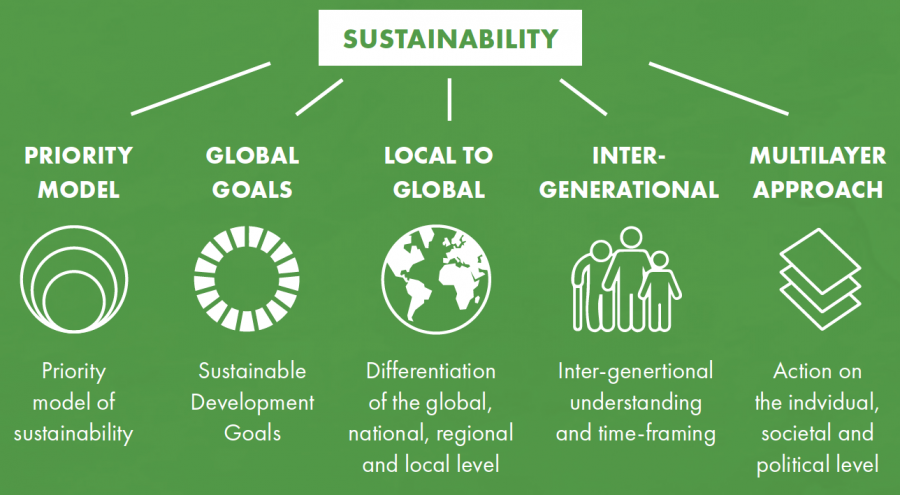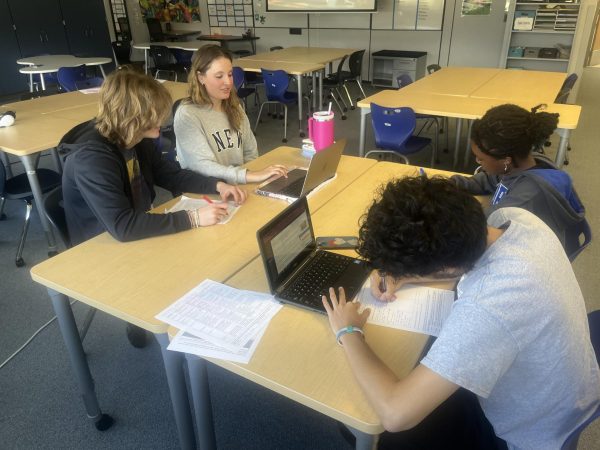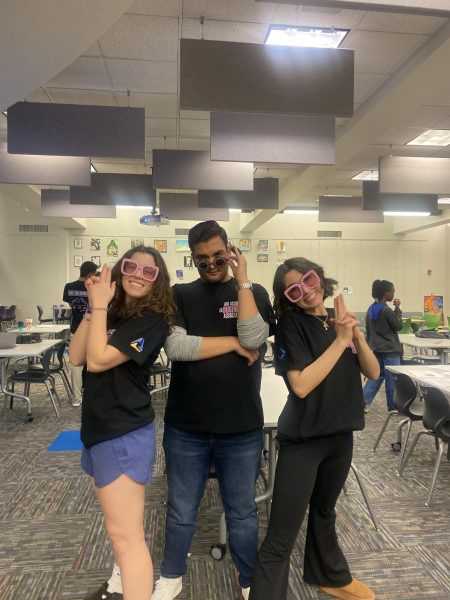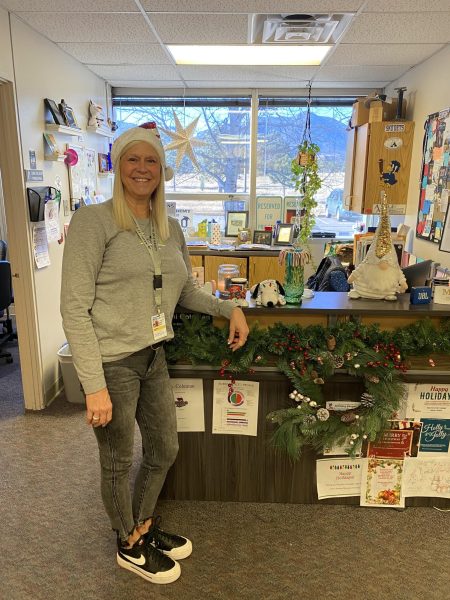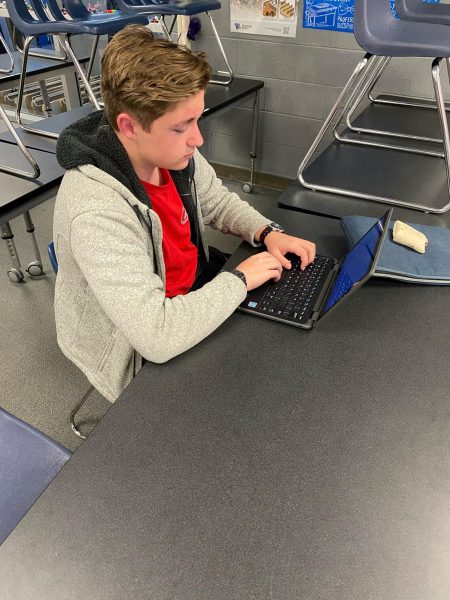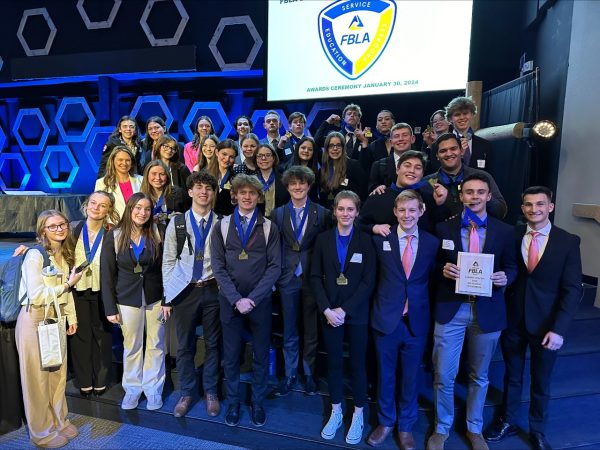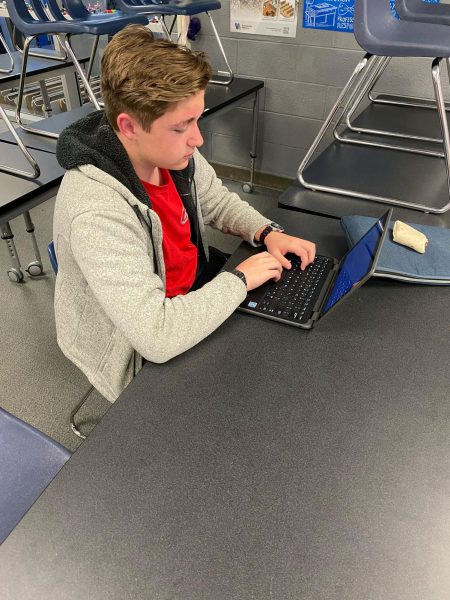15 Ways to Live Sustainably in 2021
2021 is just around the corner, and for many, the start of any new year is preceded by an inevitable string of New Year Resolutions.
This coming year, environmental science teacher Nathan Chisholm suggests making sustainable living a priority.
“Green New Year’s resolutions are a great way to start!” said Chisholm. “Like any change, it helps to start small with achievable goals, then make a plan to make it real.”
Sustainability was first defined by Our Common Future in 1987, which stated “sustainable development is a development that meets the needs of the present without compromising the ability of future generations to meet their own needs.”
While this original definition of sustainable development focused primarily on government and commercial ventures, sustainability is also something that can be applied in smaller, and more personal, but no less meaningful ways.
“Environmental sustainability is a way of being, a habit that you cultivate over time,” explained science teacher Brad Boyle. “Since the Earth Day movement began in 1970, many people have subscribed to the thought of ‘thinking globally, acting locally.’ Sustainability is one way to accomplish this.”
Nowadays, sustainable living is practiced by many individuals (including several here at Air Academy), with the primary focus of reducing one’s carbon footprint.
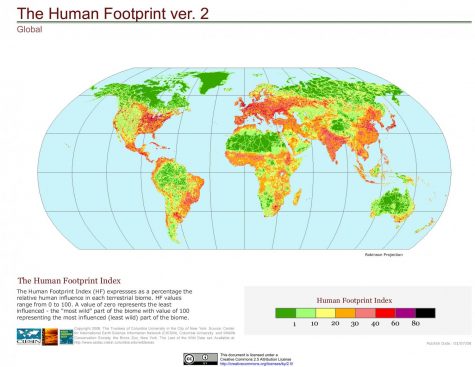
“It is important to have an environmentally sustainable lifestyle in order to reduce the negative impacts of our daily lives on the environment,” said Kate and Kera Nelson, co-presidents of the Keep Colorado Green club (abbreviated as KCG).
Sustainability also relates closely to other, broader philosophies.
“Jesus, Confucius, Gandhi, Muhammad, and other philosophers and religious leaders often spoke of the importance of putting others’ wants, needs, and welfare before our own,” said Chisholm. “Making choices with others in mind means that we take their words seriously enough to actually do it.
“Studies and predictions show that those most affected by environmental degradation are often the least likely to have caused it or be able to mitigate its effects,” added Chisholm.
Without further ado: below are 15 ways to practice sustainability in the new year (and throughout these last few weeks of 2020!)
Refuse, reduce, reuse and recycle: “The Earth’s resources are, for the most part, finite,” said Cris Robson, Air Academy environmental science teacher and KCG club sponsor.
There are two primary modes to sustainability: Refuse and reduce to cut down on overall consumption. Reuse and recycle to lessen the environmental impacts of objects one already has.
“What’s important is the consumer products one buys, as well as what someone does with those things when they are finished with them,” explained Chisholm. “While many big decisions have already been made for you, there are many small decisions that students can make every day to make a difference in their natural resource usage.”
Cut down on packaging: According to the United Nations, 13,000,000 tonnes of plastic are leaked into the ocean and 100,000 marine animals are killed by plastics each year.
The environmental impact of plastic waste is undeniable, as is the human impact. 90 percent of bottled water and 83 percent of tap water contain plastic particles, a dangerous threat to human health.
Buying products that aren’t as packaging-heavy is a step in the right direction towards reducing plastic waste.
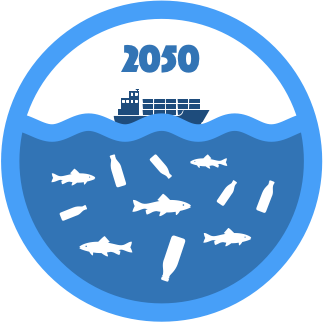
Recycle: Furthermore, a “whopping 91 percent of plastic isn’t recycled,” according to National Geographic.
Mass production of plastics began in the 1940s and 50s, and since then has only grown. Most of the plastic that is produced, however, ends up in landfills, where it spends 400 years before degrading.
Recycling is crucial to reducing waste and the betterment of the environment.
For more information on recycling in Colorado Springs visit the El Paso Website.
Consider switching up your diet: “Many people are unaware of the impact of their diet on the environment. By changing food choices, such as cutting out meat products, you can reduce your carbon footprint,” said Nelson.
Green Peace states “the livestock sector – raising cows, pigs, and chickens – generates as much greenhouse gas emissions as all cars, trucks, and automobiles combined.”
That is not to say that one has to adopt a completely vegetarian or vegan diet to help the environment. Both Chisholm and Robson eat vegetarian meals a few times over the week, which in itself is tremendously helpful to environmental health.
“I find it difficult to be fully vegetarian,” shared Robson, “but I do try not to eat as much meat as I used to!”
Eat less fast food: It may be fairly well-known that fast foods are unhealthy for the human body, but they are just as detrimental to the environment. According to the Food Empowerment Project, fast-food packaging comprises 49.5 percent of all the litter found on U.S. streets.
Reducing one’s fast food intake is exceptionally beneficial to personal, collective, and environmental health.
Shop smarter: “There are ecological benefits to grass-fed, free-range animal products as well,” explained Chisholm.
Buying locally-produced goods is generally healthier, supports your community, and reduces carbon emissions, according to Spring Power and Gas.
Fix > buy: “I repair my kids’ broken toys whenever possible rather than replacing them, and usually buy used toys rather than new ones,” said Chisholm.
In many ways, the American economy is one that is built on consumerism. Humans’ overconsumption of resources, however, is one of the leading causes of global climate change, according to Science Daily.
“I think it’s easiest to buy used products instead of new ones, except for electronics, which are often obsolescent well before they’ve worn out,” explained Chisholm.
Open the blinds: “Our house has a section that we call the ‘sunroom,’” said Robson. “It heats up with solar energy.”
Opening the blinds reduces the burning of fossil fuels to produce electricity, in terms of lighting and heating.
Line dry: Although the weather in Colorado tends to be tempestuous, it is still possible to line dry clothing as Chisholm’s family does.
Line drying reduces the electricity that would otherwise be used in an electric clothes dryer, reducing carbon emissions.
Rethink fast fashion: Popular fashion brands such as Brandy Melville, H&M, and Zara are largely marketed towards Millennials and Gen Z as a cheap and easy way of keeping up with the latest trends. With that affordability, however, comes an environmental price tag: the fashion industry is the second-largest consumer of the world’s water supply, produces ten percent of all carbon emissions, and pollutes Earth’s oceans with microplastics, as reported by Business Insider.
Eco-friendlier fashion choices include shopping from sustainable brands, thrifting, and buying second hand. Investing in quality and ethically-made clothing can often be a more expensive option, but these garments ultimately have more longevity than those produced by fast fashion brands. Thrifting and vintage clothing also presents a wide array of options: it is possible to find interesting and unique pieces of clothing.
Be mindful of the environment during the holidays: “Holidays are prone to excess in consumption. It is much more difficult to make friendly choices, but alternatives still exist,” said Boyle. “Reuse gift boxes, use recycled content wrapping paper and cards, use LED lights, and cut down on consumption of food to what you actually are going to eat.”
“Stay mindful of energy and resource usage,” advised Nelson.
Sustainability is the best gift one can give: “One does not need to buy a ton of new things as gifts that will go unused or unappreciated,” said Robson.
Think outside the box for presents:
“I did an upcycling project with my environmental science kids for the past two years over the holidays where students took items destined for the trash and remade them into very cool gifts!” said Robson.
“I believe that experiences, time, and people are more valuable than things,” offered Chisholm. “Focusing on any of those three rather than buying more things can be relatively low-emissions ways to enjoy the holidays without contributing to our environmental problems.”
Write to legislators: “I advocate and publicize efforts that lead to greater environmentalism. Large policy changes mostly begin with grassroots efforts that begin at the local level,” said Boyle.
Contacting representatives is an excellent way to make your voice heard, and at times, can prompt real legislative change. Local legislators to write to include District 20 Representative Terri Carver, State Senator Paul Lundeen, Congressman Doug Lamborn or U.S. Senators Michael Bennet and Cory Gardner.
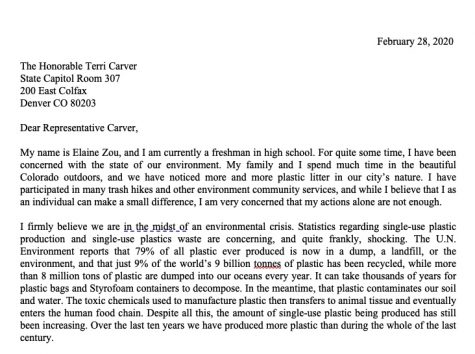
Letters can be regarding specific pieces of legislation, or simply a call to action. For more information on how to write about environmental issues to legislators, visit the Sciencing website.
Join AAHS’ environmental clubs: AAHS is home to environmental groups “River Watch” and “Keep Colorado Green.”
“KCG strives to promote environmental protection and sustainability, as well as educate members about environmental efforts in our community,” said Nelson. “We contribute to maintaining clean public spaces and provide opportunities to engage in environmental protection efforts in the political sphere.”
Due to the pandemic, KCG has canceled all events and meetings, but hope to continue with regular club activities in the second semester. For any additional information, contact Kate Nelson, Kera Nelson, or Cris Robson.
Become educated (and educate others): “The very first thing is education. I think if people were aware of this issue they would behave differently,” observed Robson.
Boyle recommends websites Regional Climate Weeks and Earth Day as excellent educational resources.
“Sustainability is a habit that ties to greater environmentalism,” concluded Boyle. “Your generation will affect change in this area. We need to before it is too late.”

Hey all, I'm Elaine! I'm a junior, and I'm super excited to be in my second year with the Jetstream Journal. Additionally, I'm involved in speech and debate,...



